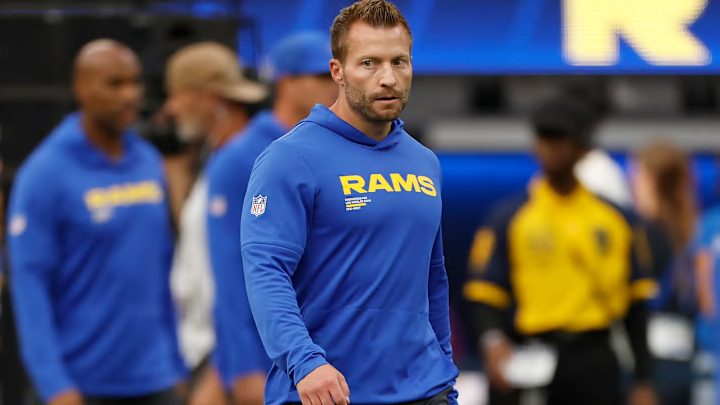The Los Angeles Rams entered Week 5 against the San Francisco 49ers on Thursday Night Football with several advantages. The offense had a stronger arsenal of accomplished and experienced weaponry. It was a short week, giving the hometown team the advantage of no travel time.
But most of all, in the grand scheme of NFL tie-breakers, Los Angeles needed the game more.
Still, hopes are quickly tossed aside without a solid plan in place. And those plans cannot remain rigid in the face of unexpected circumstances. It becomes a question of confidence or hubris, and it appears as though Rams head coach Sean McVay was guilty of the latter.
This was a slugfest, a game marred by a Niners' cheap shot that proved to be a turning point in the game. But cheap shots are nothing new. Teams face those all the time.
What this team seldom experiences is a complete whiff on strategy employed by McVay. But he was brutally honest in his post-game press conference.
It was a painful media encounter. McVay was a caldron of emotions that included frustration, anger, disappointment, and anguish. When asked why he chose to go for a first down on 4th-and-1 in overtime with the Rams trailing by three points at San Francisco's 11-yard line, he replied succinctly:
"It was a bad call. It was a bad call by me. "
Going for a first down on 4th-and-1 in OT is a bad call
The Rams made several questionable decisions when the game turned to overtime. Deferral is a strategy to ensure the offense gets the football after halftime. But in overtime, there is no obvious reason not to want the football. The team that takes possession first places all the pressure on the other team.
And yet, Los Angeles opted to kick off to San Francisco in overtime.
LA's defense was struggling all night, and it struggled to stop the Niners in overtime. By the time the Horns took over on offense, they were trailing by a score of 26-23. The ploy had backfired, victory meant scoring a touchdown, and it seemed the decision to go for the win was made at the coin flip.
The offense started well, finding speedy wide receiver Tutu Atwell for a 38-yard completion that placed the football at the opponent's 20-yard line. But an incompletion, a 4-yard completion, and a 5-yard completion set up the final errant decision.
Take the shot at a game-tying field goal, or go for the first down behind an offensive line with two backups starting?
The Rams decided to go for a first down:
The build up. The stop. The celebration.
— NFL (@NFL) October 3, 2025
What an ending on TNF 😮💨 pic.twitter.com/Kyk0VNDXPg
Had the offense run effectively, this may have made sense. Had the running backs held onto the football, perhaps this would have gone well. But the running backs had already fumbled twice. The running game was only effective enough to set up the passing game. The running backs are elusive and svelte, not the type of pile-moving power backs who can be counted on in short-yardage situations.
Confidence or hubris? You decide.
It was the game, and it is the type of loss that forces a team into a frantic self-examination. Too many things were going wrong, overwhelming the pieces that went right. In the end, this was a costly loss that has to catalyze change. After five games, Los Angeles is still 3-2. But the team's two losses have been alarming. Can McVay effect mid-season improvements in times to return to the road to success?
That is a decision that falls squarely on the head coach. The fate of the season hangs in the balance.
As always, thanks for reading.
